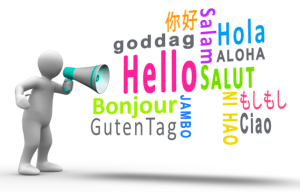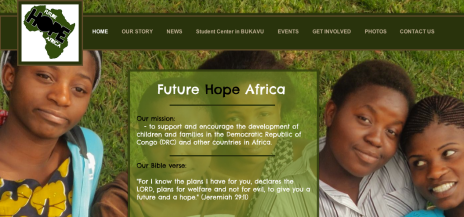 (A to Z Blogs April 2015 – Back to Africa)
(A to Z Blogs April 2015 – Back to Africa)
Language in Africa can both unite and divide at the same time. I saw this in action in East Congo and neighboring Rwanda.
It’s terrific when a lingua franca (i.e. bridge language or language of trade) crosses barriers. Take “Jambo” for instance. I learn to say this to folks outside our education center. It’s basically “hello” in Swahili and will serve you well in lots of places across Africa (i.e.Kenya, Tanzania, Zanzibar, Uganda, Democratic Republic of Congo, Zambia, Mozambique, Malawi, Rwanda and Burundi, Somalia, and the Comoro Islands.) Even though Swahili isn’t the language of Ethiopia, I clearly remember people using it there as well. I suspect the greeting is common across many more countries.
Inside Future Hope Africa’s center, I use the French greeting “Bonjour.” The Democratic Republic of the Congo (DRC) was once part of the Belgian Congo (also Zaire) which established French as the country’s language of interaction with the western world. Within the country, though, it draws a dividing line between those who are educated, and those who are not. And how well someone speaks French can give an employer, or anyone else, a measure of the person’s level of education.
 If you’re a local and happen to speak English very well, you might be Rwandan. Since the town in which we’re located is right on the border. Crossing in and out of the 2 countries the languages create a demarkation as clear as the river–an impediment that may be crossed with the right effort and know how. However, many folks from East Congo fled the over-flooding genocide of the 90’s to places where English was spoken, and a good number of others have studied English. Again, it’s a mark of education.
If you’re a local and happen to speak English very well, you might be Rwandan. Since the town in which we’re located is right on the border. Crossing in and out of the 2 countries the languages create a demarkation as clear as the river–an impediment that may be crossed with the right effort and know how. However, many folks from East Congo fled the over-flooding genocide of the 90’s to places where English was spoken, and a good number of others have studied English. Again, it’s a mark of education.
But if you think you can come as an aid worker with your French and reach people, you might be wrong. For example, one young woman who came to our education center out of curiosity ran away when she was greeted and asked a question in French. Later she explained that she was “ashamed” because she could not understand what she was being asked. After hearing about her, I switched to using “Jambo” the most. We want to make connections across the world and draw people in rather than drive them away.
Poignant to me, we interviewed two newly sponsored students (about 4th and 5th grade/year) in French so we could send their sponsoring family a video thank-you-get-to-know-you. When we asked their parents if they would like to say a few words, they were all eagerness…except that they could not speak French, only Swahili.
That’s when it really struck me how language can even divide a family. What does a mother feel when she does not understand what her child is saying? In this case, I think it was hope, because those French words in combination with the funds to continue school could mean a better tomorrow for her daughter.
Then, with my soul-sister’s family, I tackled another langauge. I always thought Swahili was Bintu’s first language, the one she used at home growing up. Turns out I was right and wrong. Her family’s group language is Mashi and fairly wide-spread in the area I visited. When I used this with her family, they laughed and laughed to hear this local tongue from mine. Rather than separating us, though, they embraced my efforts and nodded with understanding at how Bintu and I became family.
______________________
Kristin King is an author, publisher and co-founder of the nonprofit Future Hope Africa which is based in the Democratic Republic of the Congo. She is from Kentucky (USA) and lives as an expat in Holland.





Tirimba Ogoti
May 25, 2015 at 9:32 am
I’m from Kenya and travelled sometime back in Rwanda but I found that only a few Rwandese speak English, French and Kiswahili, especially the older people. Most people speak Kinyarwanda. So Rwandese greetings like “Mwaramatse” came in handy. Also, the Kiswahili spoken by one Burundian I met there had some French influence, making it a bit hard for me to make out some phrases.
kristinkingauthor
April 16, 2015 at 7:28 am
Yes, and finding the simple things we can enjoy together means so much.
kristinkingauthor
April 16, 2015 at 7:27 am
I don’t know where all it will work. I have a friend moving to Togo, I’ll have to ask if it’s heard there.
lisabuiecollard
April 11, 2015 at 5:12 pm
Wow. I had no idea. Language is such a powerful force. Thank you for sharing this. Very interesting, and enlightening. I think many Mexican families here in the US know exactly what it feels like to have their children speak a language they don’t. It happens all the time here. Lisa, co-host AtoZ 2015, @ http://www.lisabuiecollard.com
J.L. Campbell
April 11, 2015 at 2:54 pm
Thanks for sharing this. We connect so much better once we cross language barriers.
Rosie Amber
April 11, 2015 at 7:34 am
Jambo sounds like a great word and fantastic to have a word which reaches across different countries. Well done for learning new languages too.